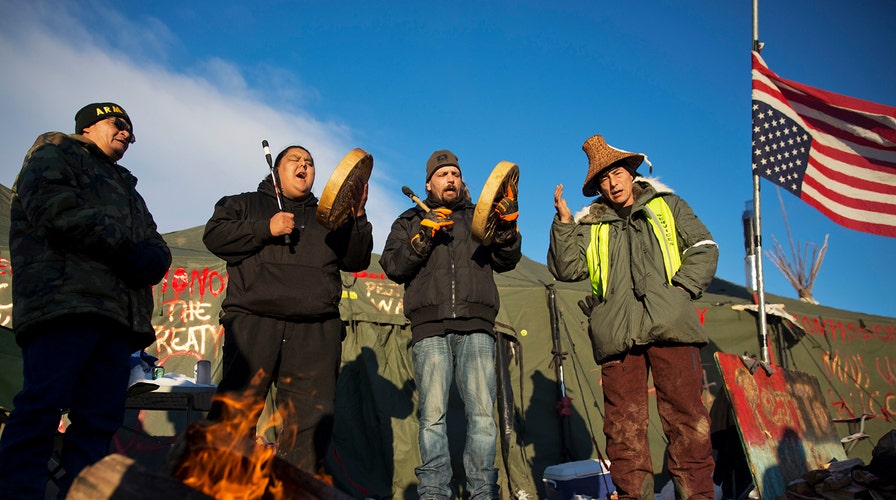Feds agree to halt Dakota Access oil pipeline
Army Corps of Engineers' will look for alternate routes
House Speaker Paul Ryan called the U.S. Army Corps of Engineers’ decision Sunday to deny a government permit for the Dakota Access oil pipeline in southern North Dakota “big government decision-making at its worst.”
Ryan, R-Wis., tweeted out his displeasure hours after the decision was made. He added that he looks "forward to putting this anti-energy presidency behind us."
The decision handed a victory to the Standing Rock Sioux tribe and its supporters, who argued the project would threaten the tribe’s water source and cultural sites.
Ryan comments echoed the sentiments of other North Dakota leaders. Gov. Jack Dalrymple called it a “serious mistake” that prolongs the dangerous situation” of having several hundred protesters who are camped out on federal land during the bitter winter season. U.S. Rep. Kevin Cramer said it's a "very chilling signal" for the future of infrastructure in the United States.
The company building the pipeline, Dallas-based Energy Transfer Partners, slammed President Obama’s administration in a statement, calling the move political.
The company said the decision was "just the latest in a series of overt and transparent political actions by an administration which has abandoned the rule of law in favor of currying favor with a narrow and extreme political constituency."
The company reiterated its plan to complete construction of the pipeline without rerouting around Lake Oahe.
The four-state, $3.8 billion project is largely complete except for the now-blocked segment underneath Lake Oahe, a Missouri River reservoir. Assistant Secretary for Civil Works Jo-Ellen Darcy said in a news release that her decision was based on the need to "explore alternate routes" for the pipeline's crossing. Her full decision doesn't rule out that it could cross under the reservoir or north of Bismarck.
"Although we have had continuing discussion and exchanges of new information with the Standing Rock Sioux and Dakota Access, it's clear that there's more work to do," Darcy said. "The best way to complete that work responsibly and expeditiously is to explore alternate routes for the pipeline crossing."
The news was met by cheers and chants of “mni wichoni” – “water is life” in Lakota Sioux. Some in the crowd banged rums. Miles Allard, a member of the Standing Rock Sioux, said he was pleased but remained cautious, saying, "We don't know what Trump is going to do."
"The whole world is watching," Allard added. "I'm telling all our people to stand up and not to leave until this is over."
Attorney General Loretta Lynch said Sunday that the Department of Justice will "continue to monitor the situation" and stands "ready to provide resources to help all those who can play a constructive role in easing tensions."
"The safety of everyone in the area - law enforcement officers, residents and protesters alike - continues to be our foremost concern," she added.
Morton County Sheriff Kyle Kirchmeier, whose department has done much of the policing for the protests, said that "local law enforcement does not have an opinion" on the easement and that his department will continue to "enforce the law."
U.S. Secretary for the Interior Sally Jewell said in a statement that the Corps' "thoughtful approach ... ensures that there will be an in-depth evaluation of alternative routes for the pipeline and a closer look at potential impacts."
Earlier Sunday, an organizer with Veterans Stand for Standing Rock said tribal elders had asked the military veterans not to have confrontations with law enforcement officials, adding the group is there to help out those who've dug in against the project.
About 250 veterans gathered about a mile from the main camp for a meeting with organizer Wes Clark Jr., the son of former Democratic presidential candidate Gen. Wesley Clark. The group had said about 2,000 veterans were coming, but it wasn't clear how many actually arrived.
"We have been asked by the elders not to do direct action," Wes Clark Jr. said. He added that the National Guard and law enforcement have armored vehicles and are armed, warning: "If we come forward, they will attack us."
Instead, he told the veterans, "If you see someone who needs help, help them out."
Authorities moved a blockade from the north end of the Backwater Bridge with the conditions that protesters stay south of it and come there only if there is a prearranged meeting. Authorities also asked protesters not to remove barriers on the bridge, which they have said was damaged in the late October conflict that led to several people being hurt, including a serious arm injury.
"That heavy presence is gone now and I really hope in this de-escalation they'll see that, and in good faith . the leadership in those camps will start squashing the violent factions," Cass County Sheriff Paul Laney said in a statement, reiterating that any violation will "will result in their arrest."
The Associated Press contributed to this report.













































